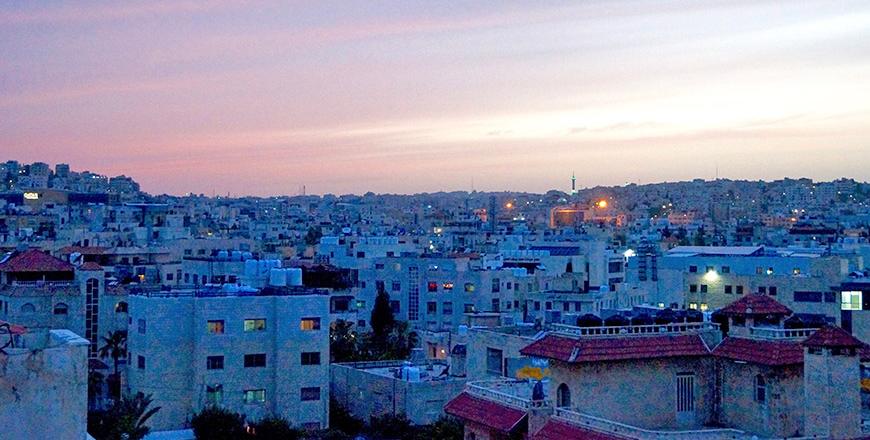You are here
Amid pandemic, Jordan sees rise in social unity, cohesion — survey
By JT - May 14,2020 - Last updated at May 14,2020

The initial results of a recent online poll of 16,427 Jordanians aged 14-70 in all 12 governorates, conducted by Analyseize Research, show that ‘positive things can happen in the giant social experiment that is an international lockdown’ (Photo by Victoria Irene)
AMMAN — With a plethora of worldwide reports outlining the consequences of the COVID-19 pandemic on fragile social states and political structures globally, recent results from Jordan suggest another perspective: A rise in social unity and cohesion, according to a Jordanian research firm.
The initial results of a recent online poll of 16,427 Jordanians aged 14-70 in all 12 governorates, conducted by Analyseize Research, show that “positive things can happen in the giant social experiment that is an international lockdown”, the research firm said in a statement shared with The Jordan Times.
The poll aimed to capture Jordanians’ perceptions towards COVID-19 and measures taken by the government on May 10-11 ahead of Eid Al Fitr, the feast marking the end of the holy month of Ramadan. Any other year, people would be having immense numbers of social interactions, but this year the public is instead dealing with “rising lockdown frustration”, read the statement.
While many are committed to social customs associated with the religious occasion, the poll showed a level of understanding on placing the importance of fighting the disease over personal desires, with 62 per cent of citizens supporting the decision to ban Eid Al Fitr prayer in mosques and public spaces, and only 11 per cent of Jordanians supporting lifting the curfew during the three-day holiday, the poll showed.
The majority of Jordanians — 89 per cent — understood the necessity of having some lockdown measures during the holiday, and 56 per cent even supported the strengthening of curfew measures by imposing a full nationwide lockdown during the three days of Eid Al Fitr.
Only 33 per cent showed a preference for maintaining the current curfew, which allows citizens to leave their homes from 8am till 7pm. However, 64 per cent of respondents felt that these curfews and lockdowns should not apply and should even be lifted in governorates that have not reported any new COVID-19 cases for at least 14 days, the research firm said.
The overall theme highlighted in all Analyseize Research pandemic polls so far has been the “united stand of the country in the fight against the coronavirus for the people of Jordan and its government”, the polling firm said in the statement.
In line with this recurring theme, 84 per cent expressed trust and confidence in recent government actions and measures, while 75 per cent considered the measures taken by authorities to combat the coronavirus to be “optimal”.
Furthermore, satisfaction in government performance related to returning Jordanian students to Jordan has been “quite high”, with 86 per cent of Jordanians polled claiming to be satisfied with government management and student quarantine arrangements, the survey showed.
However, decisions and performance related to the economy and the handling of truck drivers at the Jordanian borders had the lowest satisfaction levels observed since the start of the pandemic, with approval ratings of 51 per cent and 55 per cent, respectively.
In “trying times” of panic and despair, 82 per cent of Jordanians still believe that the situation in Jordan is going in the right direction, “which is at its highest levels when compared to other results published by other firms just a year ago showing a 30-40 per cent of Jordanians feeling the same optimism”, Analyseize Research said.
On the downside, the high satisfaction in government efforts showed a 12-per cent drop from Analyseize Research’s first poll in March, “which can be attributed to various reasons, including decisions that weren’t perceived to be well-planned”, the statement said.
Given the unfamiliarity of the current times, this was to be expected given the lack of experience in handling such a crisis, and the use of a trial and error approach with decisions revised on a daily basis based on feedback from stakeholders and the outcomes that subsisted, read the statement.
One “overwhelming change” in perceptions was people’s stance towards COVID-19. Findings reveal a significant rise in the belief that “others were not taking the dangers of the virus seriously”, from 33 per cent (March 24results) to 39 per cent (April 16results) and to a booming 63 per cent in the firm’s latest poll.
Furthermore, results reveal that there has also been a rise in the belief that Jordanians are not abiding by or taking the curfew seriously, which jumped from an average of 41 per cent (March-April results) to 61 per cent.
Following this, 87 per cent supported the reporting of violations of both the curfew and social distancing measures imposed by the government, in order to minimise the spread of the virus, the survey showed.
There is a “discrepancy” between how seriously people claim they are taking these measures and how seriously they think others are treating the situation, Analyseize Research said. Asking questions in the third person, such as “how do you think others think/do/feel…” can often be a way of probing questions that have to do with social impact. Thus, when asked what they would do in the event that the government lifted the curfew between 8-6pm during the Eid holiday, almost half reported that they would visit immediate family — which is a “clear violation of procedures” — while 15 per cent would like to pay respect to lost ones by visiting graveyards, the firm said.
Part of the poll also aimed at assessing fear and annoyances experienced by Jordanians after almost two months since the outbreak affected the country; 44 per cent stated that their fear of catching coronavirus was a top worry, the poll showed.
While 60 per cent of respondents feel that their fellow citizens lack awareness on preventative measures, including social distancing, avoiding large gatherings, wearing a mask, etc., 43 per cent claim that they are worried and bothered by others’ attitudes, according to the survey.
Data reveals an almost even split between those who feel citizens should be more responsible and follow government regulations on avoiding gatherings, social distancing and wearing a mask, at 46 per cent, and those who feel that the government should impose more stringent punishments to ensure that citizens abide by preventative measures, at 54 per cent.
Furthermore, an overwhelming 85 per cent support a possible decision to continue quarantine measures by the government, in case of exacerbation of the situation with the spread of COVID-19, until June of this year, the poll indicated.
Related Articles
AMMAN — Poll results on how citizens view the government’s Covid-19 measures one month into the epidemic revealed that an overwhelming major
AMMAN — During Eid Al Fitr holiday, Aqaba received 70,000 local and foreign visitors, the Jordan News Agency, Petra, reported on Wednesday.
AMMAN — Hotel occupancy rates in the Kingdom witnessed a boost during the Eid Al Fitr holiday, and in some locations it reached 100 per cent

















